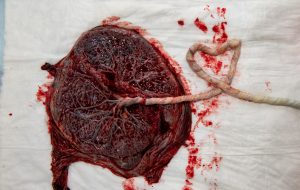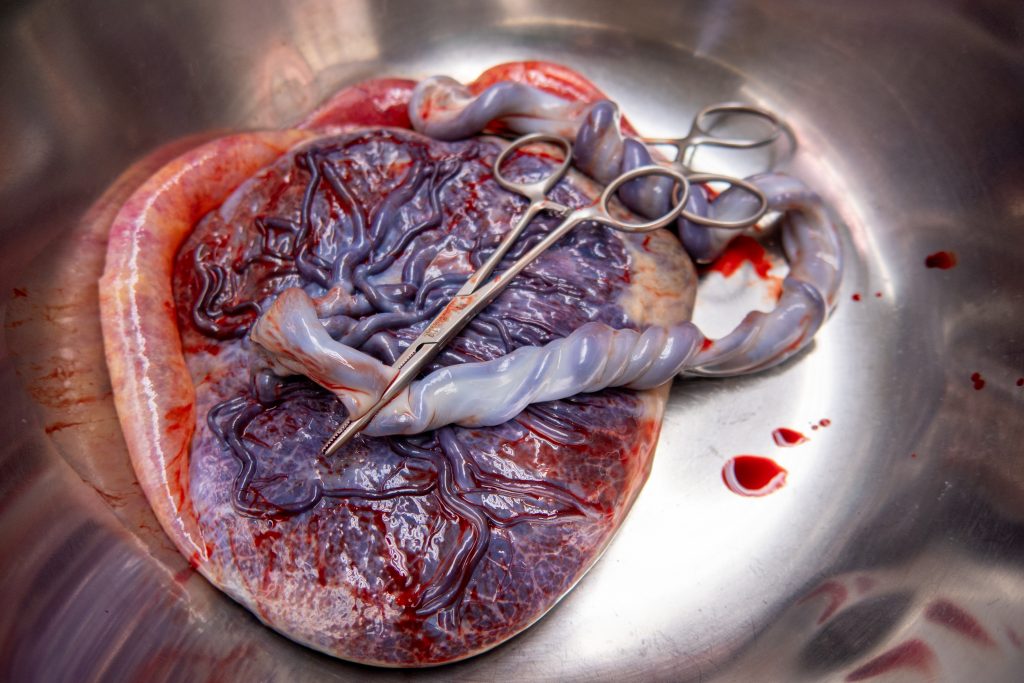One of the things that women get told as they get towards their estimated due date (EDD) and in particular, post EDD, is that their placenta is failing. As if the placenta is a stock item in the supermarket that comes with an expiry date, this can be a very alarming thing to hear when you are nearing the end of your pregnancy.
You have come all this way, you have faced all the challenges and hurdles pregnancy brings about, you have suffered through the sickness and the soreness, the roller-coaster of hormones and you’re almost there! The last thing you need is the fear of a failing placenta to encourage an induction for your birth.
Below we are going to go through the research regarding this subject and what truly happens to the placenta as your pregnancy progresses.
An incredible paper, and one I highly recommend every mother read is Aging of the Placenta by Professor Harold Fox.
Mr Fox makes a great point that many women, with suspected large babies, are told to induce before getting to the 39-40-week mark to avoid further growth of the baby. If this is true, isn’t it fair to say that using this scare tactic as well as the tactic of a failing placenta shows the inadequate, or limited, research many of these beliefs run from?
These are two contradicting views on the abilities of the placenta, both cannot be correct unless there is medical evidence showing a failing of the placenta.
“The high incidence of fetal macrosomia of babies past 42nd week of gestation shows the placenta continues to function well beyond the 40th week of gestation and remains capable of sustaining fetal growth.”

Throughout his paper, many scientific terms are used as he delves down to the cellular level of the placenta and how it evolves throughout its life. What he has found is that there are 5 types of villi throughout the placenta, and by the time of birth, villi known to create changes in the beginning of pregnancy are still present at the completion of it, showing that these cells don’t reach a deterioration due to ‘age’. There is no noticeable decrease in number of cells at term, and many placentas birthed past term have shown no increased incidence of abnormalities on examination.
This shows that as the placenta continues through the pregnancy, it does not naturally hit a point of deterioration prior to the birth. As stated, it seems to be based in a belief that the placenta is not dissimilar from other organs such as the gut, which relies on the constant replicating of stem cell layers as they produce short life cells.
Therefore, believing that the placenta (which is a foetal organ) should age while other foetal organs do not has no logical reasoning behind it.
Read more in depth of his point of view and explained studies at:
https://fn.bmj.com/content/77/3/F171

Another great paper by Sophie Messager highlights how the theory of placental failure has never been proven. Sophie has a PHD in Physiology of Reproduction and has 20 years of experience in research and gained my immediate interest as she brings light to the investigation of this concept in a light and humorous way.
As she notes, “good scientists understand that science isn’t black and white” and I feel this is imperative to keep in mind when speaking to your care providers and hearing their opinions.
Many things in life are never truly black and white, and the more that we take that on board and look at situations in a new light, with no precedence and its own set of circumstances, we can make the best decisions for all involved with the desired outcome.
Sophie dissects the POSSIBLE link, not a proven link, that many papers claim regarding the length of pregnancy and the state of the placenta.
She does this in relation to a paper by Maiti et al, found here, where a great finding is noted:
Many studies state that the cellular changes of the placenta may form part of what starts labour.
Now, if you have read any of my blog posts before, you will know my love for evidence-based birth.
Not just the concept, but the independent organisation and the work they do.
They have put together a great article on what to expect should you require a medical induction, whether or not a ‘failing placenta’ has been put on the table, and all the evidence surrounding inductions.
Should you read all the studies regarding what a failing placenta may mean coming from your care providers, and decide the reward outweighs the risk and go ahead with an induction, it is important to understand you are therefore signing up for all the ongoing inductions throughout labour. It is not the initial induction, but many decisions following that may be challenged or changed.
This article includes information on:
- controversy of due dates
- induction vs waiting for labour
- ARRIVE study of 39-week inductions
- Other ways to lower risk of caesarean
- Benefits of expectant management
- INDEX trial from the Netherlands
- SWEPIS trial from Sweden
- Cochrane meta-analysis
- VBAC specific situations
- Guidelines surrounding induction of labour

As with many areas in pregnancy, childbirth and the postpartum period, more research needs to be conducted to rewire the very common belief of a placenta being able to fail before it is no longer needed.
Always do what feels right for you and your situation, as Sophie reiterates, science isn’t black and white. However, I feel after reading the studies that have been conducted on the placenta, if it still has a job of providing nutrients, oxygen, and other important duties, it has no reason to begin senescence. Should there be any changes to the placenta physiologically, it seems to be a change that actually brings about labour, therefore nothing to be concerned over.
You should always have time to make an informed decision, and by reading these papers and understanding the studies I believe no matter what your decision is you will feel comfortable making it and feel better knowing you weren’t scared into the decision with no alternative.
My name is Cara Green, and I am a birth doula, trained through the Doula Training Academy. If you would like to have a chat about working together or wanting more information on my services, please contact me via one of the below platforms.
I can’t wait to connect with you!
Business Name:
Intuitive Birth
Business Email:
[email protected]
Facebook Page:
https://www.facebook.com/intuitivebirth.ds
Instagram Page:
https://www.instagram.com/intuitivebirth.ds/
Mobile Phone:
0422 524 290

